August 2023
- English
- 日本語
Overseas Development of Michi-no-Eki: Spotlight on Michi-no-Eki Pakewa in Indonesia
-
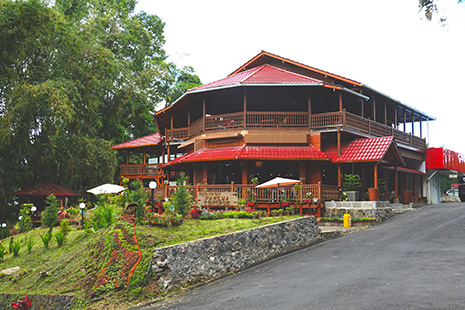
Two Michi-no-Eki facilities have been opened in Indonesia thus far. This one shows Michi-no-Eki Pakewa. Photo: Kato Fumio -
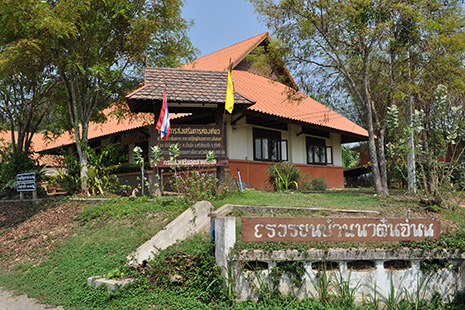
The Michi-no-Eki in Sukhothai, central Thailand, created a space that includes a restaurant offering local cuisine and a gathering area for villagers to come together.
Photo: Kato Fumio
-
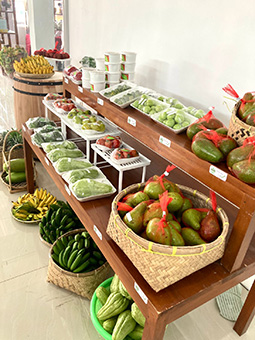
The section of Michi-no-Eki Pakewa for selling organic, pesticide-free vegetables has a neat display for easy viewing and selection. Photo: Kato Fumio -
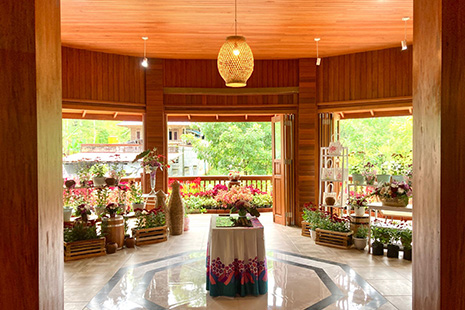
The city of Tomohon, where Michi-no-Eki Pakewa is located, boasts a high altitude in a highland area known for its vibrant flower cultivation. The entrance hall has an array of various flowers. Photo: Kato Fumio -
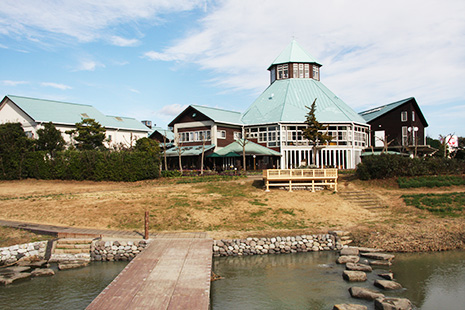
Currently serving as an advisor, Kato was associated with the top-ranked "Michi-no-Eki Tomiura Biwa Club" (Minamiboso City, Chiba Prefecture) in the National Michi-no-Eki Grand Prix.
Photo: Michi-no-Eki Tomiura Biwa Club -

"Biwa soft-serve ice-cream" emerged as a creative solution for using loquats that don't meet delivery standards. It has now become synonymous with the Tomiura Biwa Club.
Photo: Michi-no-Eki Tomiura Biwa Club

Since its introduction in the 1990s, Michi-no-Eki, or roadside station, have grown extensively across Japan, currently encompassing around 1,200 sites nationwide. This concept has also transcended Japan's borders, especially in Asian nations, where its implementation has expanded through the international collaboration of Japan. In this article , we hear from Kato Fumio, recognized as one of the "100 Successful Tourism Experts" by the Japan Tourism Agency, who is leading the establishment of Michi-no-Eki in Asian countries.
The Japan International Cooperation Agency (JICA), involved in international development projects in developing nations, has been assisting the global expansion of Michi-no-Eki, especially in Asia, since the 1990s when the concept gained traction in Japan. This initiative was driven by the significant inequality in wealth and development between urban and rural areas in Asian countries, where there was a pressing need for functions and effects similar to those brought by Japan's Michi-no-Eki, such as creating local employment, promoting regional development, and serving as disaster prevention centers.
Addressing this demand, Fumio Kato, renowned for creating the well-received Michi-no-Eki Tomiura Biwa Club in Minamiboso City, Chiba Prefecture, played a central part in JICA's endeavors to extend Michi-no-Eki initiatives across Asia. Kato's achievements include transforming his facility into one of the most beloved Michi-no-Eki nationwide. Despite the challenges posed by varying languages and cultures, Kato has dedicated years to imparting his insights on establishing and managing Michi-no-Eki abroad.
"The primary goal of expanding Michi-no-Eki overseas is to uplift the income of local farmers and others. Our approach goes beyond teaching cultivation techniques – we aim to equip them with skills in agricultural product processing, guide them in quality management, and even facilitate branding. This calls for the concept of the sixth industry in agriculture*," he explains. "To achieve this, we start by urging farmers to be conscious of how much consumers are paying for their vegetables. We want them to recognize that if they sell through intermediaries, there's a share taken by those middlemen, which affects the final price. On the other hand, at a Michi-no-Eki, it's a direct sale, meaning they can retain almost all their profits. This understanding marks the initial step. Through persistent efforts to change mindsets, we've seen real success."
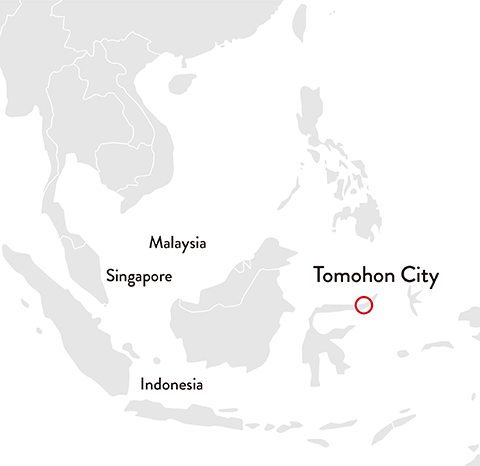

Photo: Kato Fumio
"The newest facility is Michi-no-Eki Pakewa, established in 2023 in Tomohon City, northern Sulawesi Island, Indonesia. 'Pakewa' refers to a local indigenous fruit tree that bears fruits resembling Japan's plums during the autumn season. This unique name was chosen because the officials from the Michi-no-Eki I'm associated with in Japan came to inspect it, and they decided to use the name of a local specialty fruit, similar to how they did with 'Biwa Club.' This is the second Michi-no-Eki in Indonesia," explains Kato.
"Since it is located near an active volcano in close proximity to the urban area, there was a demand for it to also serve as an evacuation site for tourists and local residents in times of emergency. To mitigate risks identified on hazard maps, the decision was made to construct the facility outside of identified risky areas. Emergency water and power supplies were put in place, and evacuation facilities were also incorporated."
"However, during the actual construction phase, the most challenging issues were the spread of COVID-19 and the impact of the wood shock, which delayed the progress of the project. Travel restrictions made us concerned, but fortunately, the facility opened in May and seems to be operating smoothly. Recently, I heard that the restaurant in the Michi-no-Eki started a delivery service. It appears to have become a place of leisure for local residents. Once the basic construction was complete, we've taken a step back – while we're keeping an eye on it, we no longer actively involve ourselves," he continues.
"Actually, we maintain contact with the local community, allowing us to stay informed about the ongoing situation and give them encouragements. The most heartwarming aspect of Michi-no-Eki Pakewa was when they chose to name it 'Michinoeki' in Japanese, which was a first."


After years of working on projects in Asian countries, Kato enthusiastically explains that effective communication with local people can often be achieved through what he humorously calls "Hug-Hug Language."
"Since I can't speak foreign languages, I start negotiations with a firm hug as part of my unique 'Hug-Hug Language' greeting with the local people. After that, everything is communicated in Japanese. I believe in directly talking to the farmers and building mutual understanding about what needs to be done. I want to express our intentions through our attitude first. Of course, having excellent interpreters is also a must," Kato says with a smile.
"When you go to Asia, you realize there's a strong trust in Japan and in Japanese people, as well as in Japanese products. This trust translates into the receptive attitude we often encounter when telling our story. The concept of Michi-no-Eki was originally developed as a strategy to revitalize depopulated regions in Japan, and it's proving effective for promoting advancement in developing countries while also garnering high interest there. The model is designed with a conscientious approach, ensuring benefits flow back to the local communities. If there were more initiatives like Michi-no-Eki, originating from Japan and spreading across the world, I believe we could make an even greater contribution globally," says Kato passionately.

Photo: Michi-no-Eki Tomiura Biwa Club
 figcaption>"Biwa soft-serve ice-cream" emerged as a creative solution for using loquats that don't meet delivery standards. It has now become synonymous with the Tomiura Biwa Club.
figcaption>"Biwa soft-serve ice-cream" emerged as a creative solution for using loquats that don't meet delivery standards. It has now become synonymous with the Tomiura Biwa Club. Photo: Michi-no-Eki Tomiura Biwa Club
* The term refers to the endeavors of agricultural, forestry, and fisheries workers to engage not only in the primary production of crops, livestock, and seafood, but also in food processing (secondary industry) and distribution/sales (tertiary industry). This comprehensive approach aims to invigorate the agriculture, forestry, and fisheries sectors, enriching the economies of rural areas, and involves integrating secondary (processing and manufacturing) and tertiary (retail and service) industries. The term "6th Industry" represents the multiplication of "Primary Industry 1" × "Secondary Industry 2" × "Tertiary Industry 3."

